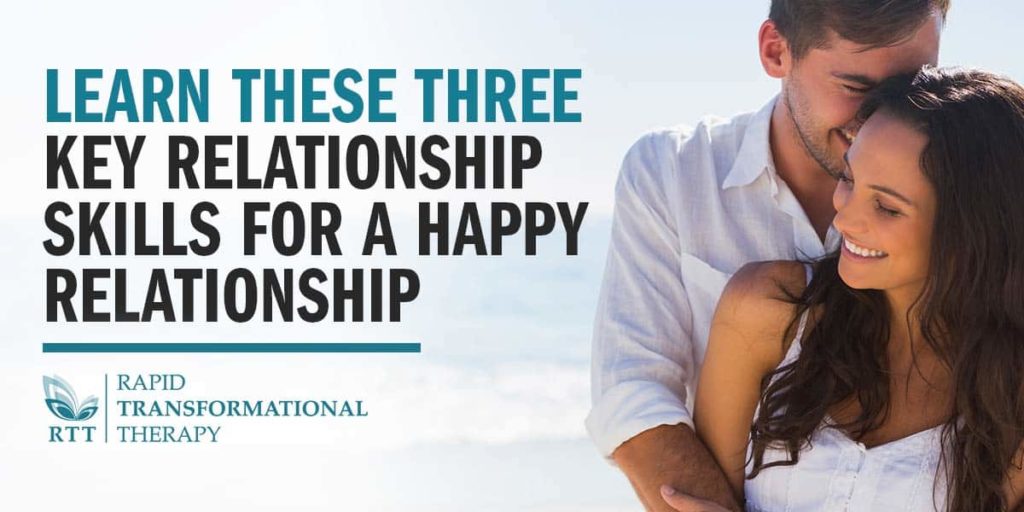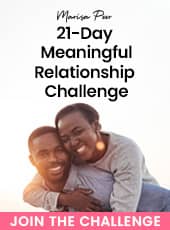Our entire lives are defined by relationships.
From the moment we’re born, we are nourished and shaped by the relationships we have with our caregivers.
Our siblings, extended family, and schoolmates all play a role in helping us learn how to best get along with others.
As we get older, our relationships with those in our network could offer opportunities to grow personally and professionally.
Interestingly enough, in our childhoods, we learn how to add and subtract, develop competencies in language, science, and even sports; but we never learn, nor practice, relationship skills such as emotional regulation, conflict management, or empathy.
We are left to navigate relationships with a lot of trial and error, sometimes resulting in toxic relationships that leave us heartbroken or even traumatized.
Without understanding relationship skills and how to use them, we may struggle to maintain healthy relationships or know when to leave unhealthy ones.
The good news is, relationship skills can be picked up, practiced, and improved upon at any point in your life.
Whether you’re already in a relationship and hoping to use relationship skills to improve it, or you’re preparing to build a fulfilling, happy one in the future, this article is for you. In fact, these skills are helpful across all kinds of relationships, romantic or otherwise.
So get ready to learn about five key relationship skills, why they matter, and what may be in the way of you mastering these skills.
Put these skills into practice and watch your relationships flourish.
In this article, you will learn:
- What relationship skills are
- Three key relationship skills you can begin mastering today for happier relationships
- How to practice your relationship skills
What Are Relationship Skills?

Relationships may not be easy. However, they don’t have to be hard.
With the right mix of skills, you may be able to enhance the way your relationship works and avoid many of the pitfalls that lead to unhealthy relationships and breakups.
Relationship skills are a combination of personal and interpersonal skills that help you elevate the quality of your romantic relationship.
These are soft skills that include communication skills, leadership skills, and teamwork skills, as well as emotional intelligence. Just like hard or technical skills you need at work, they can be developed and improved upon.
3 Key Relationship Skills for a Happy Relationship

As we are not formally taught relationship skills at school, it’s expected from us that we pick them up over the years as we grow.
Unfortunately, very few people are aware of the relationship skills they possess, let alone think about their development. Oftentimes, they realize that they lack relationship skills when it’s too late and they are on the edge of a breakup.
Marisa Peer, the UK’s #1 voted therapist and relationship expert, has helped thousands of people develop core relationship skills to fall in love with themselves and their significant other. She does this by empowering individuals to take control of their own actions and master relationship skills.
After all, without relationship skills, it’s a mammoth task to make your relationship work.
Here are the most important relationship skills you can learn to build a healthy and happy relationship:
1. Commitment
Commitment is the level of dedication you have towards people and things that are important in your life. It’s also the measure of how much energy, effort, and time you are willing to devote to your partner and your relationship.
Commitment is closely tied with attachment and love. Intentionally practicing it can bring you closer to your partner.
Sometimes, painful experiences from childhood or previous relationships result in fear of love, fear of intimacy, and commitment issues. If that’s the case, you can consider turning to a therapist to help you work through it and welcome love and commitment into your life.
Why commitment matters
Commitment keeps you going when times are difficult.
Additionally, studies show that commitment is directly linked to the longevity and quality of romantic relationships. When you are committed to your partner, you’re willing to put in the effort to fix the challenges in your relationship and move forward as a team.
The more you can communicate your commitment to your partner, the more committed your partner feels.
Without commitment, it’s difficult for love to thrive. You end up vulnerable to daily tensions in the relationship, increased conflict, and higher chances of infidelity. If you are looking for a long-term, secure relationship, being able to let your partner know you are committed is crucial.
How to show commitment in your relationship
Try these suggestions to show your partner that you’re committed:
- Support your partner by showing up for them, even on the days they may be less than lovable.
- Keep your promises so that your partner trusts that they can depend on you.
- Honor your partner and speak about them kindly, even when they’re not around.
- Focus on all the ways you and your partner complement each other’s strengths.
- Tell your partner just how important they are to you and let them know they are a priority in your life. This is where communication skills come in handy.
2. Communication

Simply put, communication is the ability to transfer information in a way that is clear, kind, and healthy. In a relationship, it means being able to express yourself and explain your needs in a way your partner can understand. It also means listening with patience and resisting the urge to jump in to fix the problem.
Communication also includes nonverbal cues, or body language, which also affect the way a message is shared and received. For example, if you smile kindly and maintain eye contact with your partner when they’re talking, they’re more likely to open up to you.
Different people communicate differently, so it’s important to work on developing communication skills that best support your relationship. This may take some trial and error, but the more you communicate, the more you can discover what works best for both of you.
Why communication matters
Communication breeds connection and intimacy. When you learn how to balance between listening to your partner with an open mind and expressing your needs clearly, your bond will deepen.
Healthy communication also allows you to solve problems together and build trust in your relationship. This is because you are confident your partner will hold a safe space for you to share how you feel. Similarly, your partner trusts you to keep an open mind and listen to them when they are ready to express themselves.
On the other hand, if you lack communication skills, expect miscommunication to happen. It can result in situations where what is being said by one party is misinterpreted or misunderstood by the other.
How to develop your communication skills
While communication skills may take time to perfect, here are some great ways for you to get started:
- Practice active listening by paying attention to what your partner is saying without interrupting.
- Share your feelings without blame or judgment using “I” statements. For example, instead of saying, “You make me angry,” try saying, “I feel angry right now because of this situation.”
- State your needs and boundaries clearly and explicitly. Try saying, “Would you mind helping me out with the dishes from time to time?” instead of, “You never help around the house.”
- Remember, non-verbal communication such as body language is a big component of communication, so be conscious of your gestures, eye-contact, and tone of voice when talking.
- Avoid poor communication habits, such as arguing for the sake of arguing, choosing not to listen during conflict, giving your partner the silent treatment, or verbally abusing your partner. In the end, you’re on the same team so call on your compassion to support them in the best way you can.
3. Compassion

Compassion is an emotional response to another’s suffering coupled with an authentic desire to help. It’s when you reach out to support your partner while they are going through tough experiences instead of turning the other way.
Compassion requires kindness and being present in the moment. You learn to support your partner in the best way possible based on their current needs. Sometimes that might mean listening without trying to solve their problem. Other times it’s as simple as asking, “Is there anything I can do to help lighten your load?”
While most of us do have a compassionate mind, certain conditions, like stress, childhood trauma, or overwhelm, could result in us being less than compassionate. In those moments, remember to be kind to yourself and consider talking to your partner or an experienced therapist to help you cope.
Why compassion matters
Compassion deepens your bond. When you are compassionate towards your partner, you’re assuring them that you care about them and that you are willing to take action to improve their life.
Compassion is a prerequisite for social connection and impacts our well-being. In fact, compassion has been linked to increased social support and decreased instances of illness. This means that practicing compassion not only benefits your relationship, but you as well.
How to be more compassionate in your relationship
If you’re hoping to strengthen your relationship through compassion, here are a few things you can try:
- Express your love for your partner, especially at the four most critical times of the day; when you see each other in the morning, when you say goodbye, as soon as you see each other at the end of the day, and when you say goodnight.
- Give your partner the space to feel their emotions. Sometimes, your partner just needs to feel down or upset for a while. Give them time to work through their feelings and cheer up.
- Listen to your partner when they are ready to share their experiences and validate their feelings instead of jumping into problem-solving mode.
- Admit when you’ve made a mistake. This will show your partner that they matter more than you being right does.
- Take care of yourself. Being compassionate also means extending yourself kindnesses, such as engaging in hobbies and doing things that bring you joy.
There are many more relationship skills worth exploring. They may take a lifetime to build but, rest assured, there’s no right or wrong way to begin practicing them.
With that said, there are a few steps you can take to begin incorporating these skills into your relationship.
How Can You Practice Your Relationship Skills?

Here’s a simple formula to how you can begin enhancing your relationship skills:
1. Learn more about different relationship skills out there
There are many kinds of relationship skills, including communication skills, conflict resolution, social skills, empathy, connection, compromise, vulnerability, emotional regulation, self-awareness, setting boundaries, and even love.
Once you become aware of the many relationship skills out there, you will be able to better identify what skills you want to work on first.
2. Assess your strengths and weaknesses
Observe yourself and the way you interact with your partner to determine which skills you’re great at and which skills require a bit more work.
Let’s say you keep having the same type of argument with your partner. One of you wants to talk things through right now, and the other partner is withdrawing from the conversation. This is an indication that you might want to start learning conflict resolution techniques.
3. Ask your partner what kind of skills you can improve
All of us have blind spots. There are situations when we are not able to clearly evaluate our own behavior. This is when we can benefit from the outside perspective of a person who knows us and wishes us well.
Your partner is a great mirror. They can offer helpful suggestions on which skills you need to improve and how you can grow. They can also support you in learning more about relationship skills and putting them into practice.
4. Make unfamiliar familiar
The things we get good at are the things we practice and become very familiar with.
As Marisa Peer says in her rules of the mind, “If you want to succeed at any level, you’ve got to make what is familiar unfamiliar, and what is unfamiliar familiar.”
So if you usually close up when your partner expresses a need, start listening openly to your partner’s needs instead. By doing this repeatedly, you’ll make listening openly—the once unfamiliar habit—your new norm.
5. Stay committed to progress
There may be times when matter how hard you try at applying relationship skills, it feels like you fall short. That’s okay. Focus on progress, not perfection.
When you are able to celebrate incremental improvements, you’re able to enjoy the process. You realize that mastering relationship skills takes consistent action in the right direction.
Focusing on perfection, on the other hand, could leave you feeling demotivated when you don’t get it right on your first try.
Making the relationship work is a team effort, so invite your partner to hold you accountable and share in the joy of your progress as a couple.
6. Join the 21-Day Meaningful Relationship Challenge
A fantastic way to develop the skills you need to cultivate rewarding relationships, and learn how to make them flourish, is to join Marisa Peer’s 21-Day Meaningful Relationship Challenge.
In this challenge, which opens to new registrants on a regular basis, teaches you to break down the limiting beliefs you hold about love and relationships, so you can both work on yourself and your perspective, as well as teach you how to thrive in an intimate relationship with another without being held back by your own mind. Click the banner below to learn more and join in.

7. Talk to an RTT® Therapist
If you are facing unnecessary challenges in developing your relationship skills due to anxiety, fears, or trauma, know that you can turn to an RTT® therapist to help you.
RTT® is a technique developed by Marisa Peer that recognizes the role of your past experiences in contributing to your relationship problems.
Through a combination of therapeutic approaches, including CBT, NLP, neuroscience, and hypnotherapy, RTT® will help you to reprogram your mind so you can elevate the quality and health of your relationship.
In just a few sessions with an RTT® therapist, you’ll be able to understand how different events in your life contribute to your relationship challenges and take steps toward putting your past to rest.
These key relationship skills help you consciously build a fulfilling romantic relationship with your partner, no matter what stage you are in your union.
Moreover, these skills will spill over into other relationships. Relationships with family, friends, colleagues, and acquaintances, will enrich as well!
So take your time mastering these skills and watch your relationships flourish.


